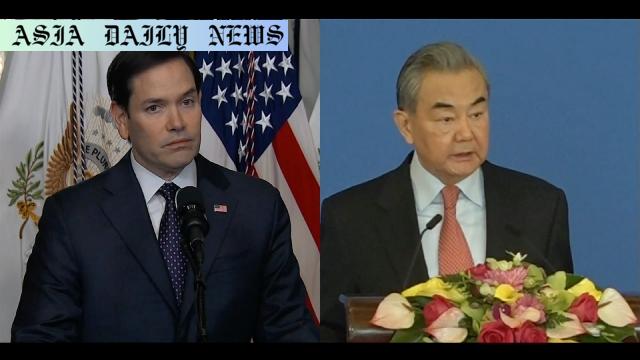US-China Relations, emphasizing communication, Taiwan concerns, and advancing mutual interests for greater global stability.
US Secretary of State Marco Rubio and China’s Foreign Minister Wang Yi held telephone talks emphasizing communication and mutual interests.
Taiwan and the South China Sea remain contentious topics, with calls for caution and international responsibility from both sides.
The US reaffirmed commitments to its allies, while China reiterated its stance on Taiwan as an integral part of its territory.
The talks come amid shifting global dynamics, as China’s Foreign Ministry calls for stability and respect for sovereignty.

Introduction
The recent telephone talks between Chinese Foreign Minister Wang Yi and US Secretary of State Marco Rubio shed significant light on the state of US-China relations, a topic of immense global importance. The discussion revolved around critical issues such as Taiwan, international responsibilities, and the need for candid communication. This high-level exchange highlights the multifaceted challenges and opportunities in fostering a stable and cooperative bilateral relationship amidst a turbulent geopolitical climate.
The Context: Reaffirming Priorities
US-China relations have long been marked by a combination of strategic partnership and intense rivalry. As Secretary Rubio reiterated the US administration’s “America First” stance, he also maintained the importance of advancing US-China relations in a way that serves American interests. Wang Yi, on the other hand, reiterated China’s non-negotiable stance on Taiwan, urging the US to exercise caution in handling matters related to the island, which Beijing considers an integral part of its territory. Both sides acknowledged the need for diplomatic channels to remain open and functional.
Key Points of Discussion
Two primary issues dominated the talks: the situation surrounding Taiwan and the controversies in the South China Sea. The US expressed concerns over China’s alleged “coercive actions,” which have raised tensions in the region. China, meanwhile, emphasized the need for mutual understanding and adherence to the principle of sovereignty. These discussions revealed the deeply entrenched differences in priorities and visions between the two nations, underscoring the challenges inherent in the bilateral relationship.
China’s Perspective
China’s statements during the talks emphasized the importance of global stability and cooperation. Wang Yi articulated that major powers must shoulder the responsibility of safeguarding world peace. This can be seen as a call to counter what Beijing perceives as unilateralism and self-interest in US foreign policy. China’s firm position on Taiwan was presented as a core issue, with a demand for Washington to approach the matter with heightened sensitivity.
The US Stance
From Washington’s perspective, the phone call served as an opportunity to reaffirm its alliances and strategic interests in the Indo-Pacific region. Secretary Rubio stated the Trump administration’s commitment to its regional partners while voicing serious concerns over what the US perceives as China’s aggressive maneuvers. Rubio’s willingness to engage in candid communication was notable, particularly given his reputation as a hardliner on China-related issues.
Implications for Global Diplomacy
This exchange between Wang and Rubio highlights the delicate balance required in US-China relations. As two of the world’s most powerful nations, their engagement—or lack thereof—has implications that stretch far beyond their bilateral relationship. From economic ties to global security, the actions of these two nations set the tone for a significant portion of international diplomacy. The emphasis placed on communication by both sides is a promising sign, even as disagreements remain pronounced.
Looking Forward
The talks underscore the urgent necessity of preserving open communication channels as tensions rise on issues like Taiwan and the South China Sea. It is essential for both countries to find common ground and address their differences in ways that foster mutual understanding and respect. While challenges remain steep, these talks may provide a framework for future dialogue and cooperation, ultimately contributing to a more stable international order.
Conclusion
The telephone talks between Wang Yi and Marco Rubio encapsulate the complexity of US-China relations in the current global context. While profound differences on key issues persist, the willingness of both sides to engage in dialogue is a significant step toward maintaining a workable relationship. Amidst an atmosphere of uncertainty, the international community watches closely as these two superpowers navigate their shared yet often conflicting roles on the global stage.



Commentary
The Importance of Dialogue in Tense Times
Engaging in dialogue, even in the face of profound differences, is essential for global stability. The recent telephone talks between China’s Foreign Minister Wang Yi and US Secretary of State Marco Rubio serve as a reminder of the importance of communication. It is through these exchanges that nations can address sensitive issues, clarify misunderstandings, and possibly identify areas of mutual interest. The world today cannot afford a breakdown in relations between two such pivotal global powers.
Challenges in Finding Common Ground
That being said, the challenges facing US-China relations are undeniable. The issue of Taiwan remains a particularly contentious subject, deeply tied to national identity for the Chinese and a marker of strategic commitment for the US. These entrenched positions make compromise difficult but not impossible. It requires both political will and creative problem-solving from both leaderships to defuse tensions and focus on collaborative efforts.
Opportunities for Collaboration
Beyond contentious issues, opportunities for collaboration abound. Climate change, global health, and economic stability are areas where the US and China can unite for the common good. By leveraging these shared challenges, both nations can build trust and demonstrate that even rival powers can work together effectively for the benefit of humanity. These avenues for cooperation could serve as stepping stones toward a more constructive relationship.
A Call for Balance
Ultimately, balance and mutual respect must guide US-China relations moving forward. Neither nation can afford an environment defined solely by competition and mistrust. By maintaining active communication channels and fostering an atmosphere of understanding, Beijing and Washington have the capacity to lead by example. The world would be well-served by their ability to balance national interests with global responsibilities, paving the way toward a more cooperative international system.